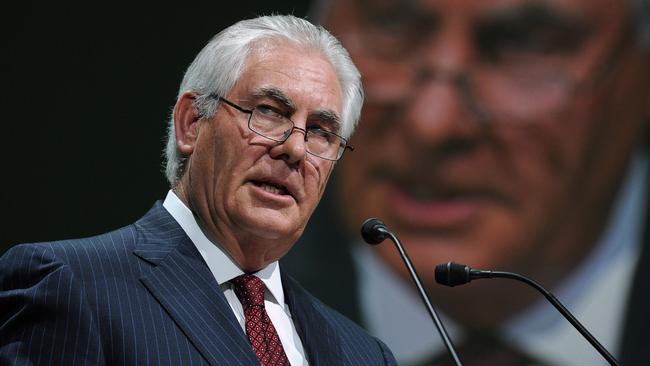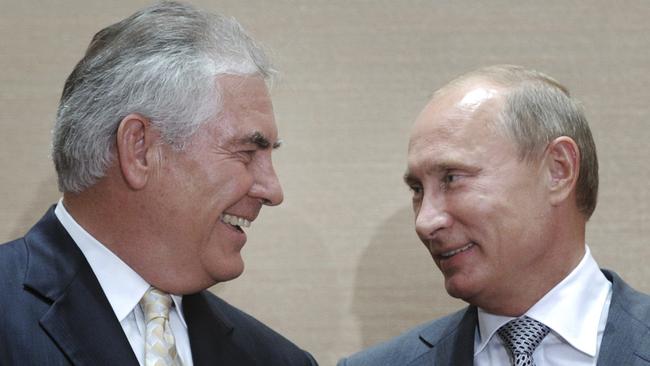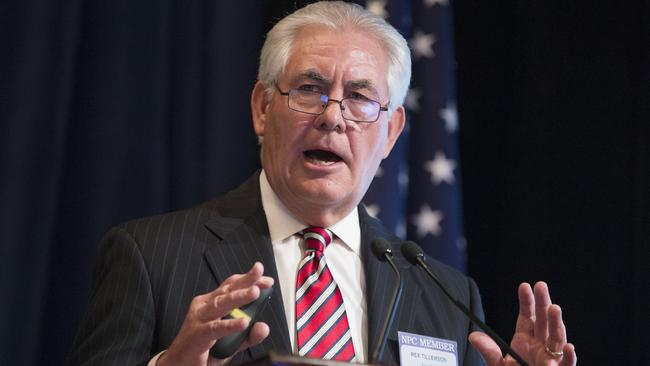Putin’s top Trump? Tillerson’s links to Russia raise concerns
Donald Trump’s pick for secretary of state is a skilful negotiator but his business links with Russia are a concern.

As chief of ExxonMobil, Rex Tillerson honed many of the skills inseparable from the exercise of high-level diplomacy: navigating complex geopolitics and pushing tough negotiations with friends and foes around the world.
The question now facing the 64-year-old Texan, as president-elect Donald Trump’s nominee for secretary of state, is whether he can bring those skills to serve US interests and break free from the oil industry that shaped him across a lifetime.
As the Republican Trump himself put it, in announcing his choice of the chief executive for top diplomat on Tuesday, “his relationships with leaders all over the world are second to none”. One of those relationships — with Vladimir Putin, who awarded him Russia’s Order of Friendship in 2013 — was likely a key asset in Trump’s view, as he pushes for a detente with Moscow.
But Tillerson’s Russia ties have raised hackles across the US political spectrum and threaten to complicate his approval by the US Senate, against the backdrop of intelligence indicating Moscow interfered to try to sway the election for Trump.
Republican senator and former presidential candidate John McCain has been among those voicing concern: “Vladimir Putin is a thug, bully and a murderer, and anybody else who describes him as anything else is lying,” he said ahead of Tillerson’s nomination.
And if Trump sees Tillerson as a dynamic deal-maker whose contacts are a precious asset for his administration, environmentalists voice serious concern at the prospect of an oil industry veteran representing the US in global climate negotiations.
Born in Wichita Falls, Texas, Tillerson — a lifelong boy scout — joined ExxonMobil in 1975 as a young engineer fresh out of college and has never worked anywhere else, steadily rising through the ranks to become chief executive in 2006.
After a decade spent overseeing the company’s business activities in more than 50 countries, the silver-haired married father of four was due to retire in March.
Steve Coll, author of a 2012 investigative book about ExxonMobil, wrote in The New Yorker that Tillerson’s life was profoundly influenced by the oil giant, an organisation that promotes almost all its leaders from within.
Coll describes how ExxonMobil perceives itself: as a transnational power independent of the US government, and possessed of its own foreign policy that seeks to create the best conditions for oil and gas production. In furthering that policy, Tillerson effectively has been “running a parallel quasi-state”, Coll says, “fashioning relationships with foreign leaders that may or may not conform to the interests of the United States government”. That includes defying the State Department to cut an oil deal in Iraqi Kurdistan, or working in partnership with authoritarian regimes despite a stated company policy of promoting human rights.
But Coll’s investigation also describes Tillerson’s record at ExxonMobil as one of professional integrity.
Tillerson’s relationship with Putin is believed to have been central to his success as chief executive. The two met in the 1990s when Tillerson was supervising a project on Sakhalin Island, and strengthened their ties when Putin took power following Boris Yeltsin’s resignation in December 1999.

Through the years, Tillerson “has had more interactive time with Vladimir Putin than probably any other American with the exception of Henry Kissinger”, says John Hamre of the Centre for Strategic and International Studies in Washington, DC.
Tillerson helped drive his firm’s presence on the lucrative Russian market as international oil majors flocked to try to tap into Moscow’s reserves after the collapse of the Soviet Union.
In the late 90s, as the head of the company’s Russia unit, the Texan spearheaded the push to get a multi-billion-dollar project on the far eastern island of Sakhalin that went on to become one of ExxonMobil’s most vaunted overseas ventures.
After becoming chief executive in 2006, Tillerson oversaw the agreement of a potentially even more profitable opportunity with the signing in 2011 of a co-operation deal with Russia’s biggest oil company, Rosneft, headed by close Putin ally Igor Sechin. The pact opened up the vast riches of Russia’s Arctic region to ExxonMobil where Rosneft — which rose from mediocrity under Putin by snapping up the assets of defunct firm Yukos — badly needed foreign expertise. The deal, at first valued at $US3.2 billion, potentially could generate a hefty $US500bn ($667.4bn) depending on oil discoveries.
In 2014 the two firms drilled their first joint exploration well in the Arctic. After the sealing of the Rosneft deal, Putin in 2012 awarded Tillerson Russia’s Order of Friendship medal for his “major contribution to the development and strengthening of co-operation with Russia”. Following Trump’s announcement, Russian state television was building up Tillerson by saying “few Americans have as good relations with the Russian President” and the Kremlin hailed the pair’s “good, businesslike relations” ties.
But as the US cranked up its economic punishment in the summer of 2014 over the pro-Moscow rebellion in eastern Ukraine — including sanctions against Rosneft — the brake was applied to relations between the two giants. While co-operation did not entirely stop, work was wound down and ExxonMobil said the sanctions had cost the firm $US1bn as progress froze on the Arctic projects and stopped the firm picking up its income from Sakhalin.
Tillerson is a vocal opponent of sanctions as a foreign policy instrument and, as secretary of state, would be in a position to benefit his lifelong employer by advocating an easing of sanctions against Russia. “We always encourage the people who are making those decisions to consider the very broad collateral damage of who are they really harming with sanctions,” he argued at a 2014 shareholders’ meeting. In 2014, at the urging of the US government, he skipped Putin’s flagship economic forum in St Petersburg — Russia’s answer to Davos — but he was back at the glitzy event this year.
Tillerson’s position as the holder of $US150 million in Exxon shares — liable to fluctuate based on his actions as top diplomat — creates a significant potential for conflict of interest, although he presumably would be required to divest his holdings.
Among the burning issues awaiting Tillerson beyond Russia are ties with China, the protracted Syrian conflict, Trump’s vow to review the Iran nuclear deal and to pull out of the Trans-Pacific Partnership Pacific Rim trade deal and the Paris climate agreement.
Beyond his advocacy for free trade, Tillerson’s broader political views are largely unknown but environmentalists are raising a red flag over ExxonMobil’s past activism on climate change.
Several US states, supported by environmental activists, are suing the oil giant for allegedly deceiving the public about the role of fossil fuels in global warming.
Tillerson himself is credited with steering ExxonMobil towards public acceptance of the science of climate change. He came out in favour of a carbon tax in 2009, which his predecessor Lee Raymond fought, but he also resisted cutting investment in the search for new oil wells.
AFP




